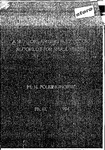A SELF-ORGANISING FUZZY LOGIC AUTOPILOT FOR SMALL VESSELS
| dc.contributor.author | POLKINGHORNE, MARTYN NEAL | |
| dc.contributor.other | School of Engineering, Computing and Mathematics | en_US |
| dc.date.accessioned | 2012-08-03T08:31:59Z | |
| dc.date.available | 2012-08-03T08:31:59Z | |
| dc.date.issued | 1994 | |
| dc.identifier | Not available | en_US |
| dc.identifier.uri | http://hdl.handle.net/10026.1/1100 | |
| dc.description.abstract |
Currently small vessels use autopilots based on the Proportional plus Integral plus Derivative (PID) algorithm which utilises fixed gain values. This type of autopilot is known to often cause performance difficulties, a survey is therefore carried out to identify the alternative autopilot methods that have been previously investigated. It is shown that to date, all published work in this area has been based on large ships, however, there are specific difficulties applicable to the small vessel which have therefore not been considered. After the recognition of artificial neural networks and fuzzy logic as being the two most suitable techniques for use in the development of a new, and adaptive, small vessel autopilot design, the basic concepts of both are reviewed and fiizzy logic identified as being the most suitable for this application. The remainder of the work herein is concerned with the development of a fuzzy logic controller capable of a high level of performance in the two modes of coursekeeping and course-changing. Both modes are integrated together by the use of nonlinear fuzzy input windows. Improved performance is then obtained by using a nonlinear fuzzy rulebase. Integral action is included by converting the fuzzy output window to an unorthodox design described by two hundred and one fuzzy singletons, and then by shifting the identified fuzzy sets to positive, or negative, in order that any steady-state error may be removed from the vessel's performance. This design generated significant performance advantages when compared to the conventional PID autopilot. To develop further into an adaptive form of autopilot called the self-organising controller, the single rulebase was replaced by two enhancement matrices. These are novel features which are modified on-line by two corresponding performance indices. The magnitude of the learning was related to the observed performance of the vessel when expressed in terms of its heading error and rate of change of heading error. The autopilot design is validated using both simulation, and full scale sea trials. From these tests it is demonstrated that when compared to the conventional PID controller, the self-organising controller significantly improved performance for both course-changing and course-keeping modes of operation. In addition, it has the capability to learn on-line and therefore to maintain performance when subjected to vessel dynamic or environmental disturbance alterations. | en_US |
| dc.language.iso | en | en_US |
| dc.publisher | University of Plymouth | en_US |
| dc.title | A SELF-ORGANISING FUZZY LOGIC AUTOPILOT FOR SMALL VESSELS | en_US |
| dc.type | Thesis | |
| dc.identifier.doi | http://dx.doi.org/10.24382/1440 | |
| dc.identifier.doi | http://dx.doi.org/10.24382/1440 |
Files in this item
This item appears in the following Collection(s)
-
01 Research Theses Main Collection
Research Theses Main


